What Type of Oil Should You Use in an Air Compressor?

Choosing the right type of oil for your air compressor is crucial for its performance and longevity. The oil in an air compressor serves several important functions, including lubricating the moving parts, reducing friction, and preventing rust and corrosion. With so many options available on the market, it’s important to understand the different types of oil and their properties to make an informed decision.
One commonly used type of oil for air compressors is mineral oil. This type of oil is affordable and widely available, making it a popular choice for many users. Mineral oil has good lubricating properties and provides adequate protection against rust and corrosion. However, it may not withstand high operating temperatures as well as other types of oil, and may require more frequent oil changes.
Synthetic oil is another option to consider. Although synthetic oil tends to be more expensive than mineral oil, its superior performance and extended service life make it a worthwhile investment. Synthetic oils are specially formulated to withstand high temperatures and offer enhanced lubrication, reducing friction and wear on the compressor’s components. This can result in improved efficiency and longer maintenance intervals.
When choosing the oil for your air compressor, it’s important to consult the manufacturer’s recommendations. They will often specify the type, viscosity, and any additives necessary for optimal performance. Regularly checking and changing the oil as recommended by the manufacturer will help ensure that your air compressor operates smoothly and efficiently.
Ultimately, the type of oil you choose for your air compressor will depend on factors such as operating conditions, compressor type, and manufacturer recommendations. Whether you opt for mineral oil or synthetic oil, it’s crucial to select a high-quality oil that meets the specific needs of your compressor. By using the appropriate oil and following proper maintenance practices, you can extend the lifespan of your air compressor and enjoy reliable performance for years to come.
Why the Choice of Oil is Important for Air Compressors
When it comes to keeping your air compressor running smoothly, the choice of oil is of utmost importance. The right oil not only lubricates the internal components of the compressor, but it also helps in cooling and sealing the pistons and valves, ensuring optimal performance and longevity of the machine.
One of the main reasons why the choice of oil is important is because different air compressors have different oil requirements. Using the wrong type of oil can lead to inefficient operation, increased wear and tear on the compressor, and even potential damage to the internal parts. It is crucial to consult the manufacturer’s guidelines or the compressor’s user manual to determine the correct viscosity and specifications of the oil that should be used.
Another important factor to consider is the oil’s ability to withstand high temperatures. Air compressors generate a significant amount of heat during operation, and if the oil cannot handle these high temperatures, it can cause the oil to break down or oxidize, leading to decreased lubrication and increased friction. This can result in premature wear on the compressor’s components and reduce its overall efficiency.
An optimal oil for air compressors should also have good anti-foaming properties. When air compresses, it can create foam and bubbles, which can impair the lubrication process and cause inadequate lubrication in certain areas. An oil with anti-foaming additives can help eliminate these bubbles and ensure consistent lubrication throughout the compressor.
Additionally, the choice of oil can also impact the overall cleanliness of the compressor system. Some oils tend to leave behind residues or sludge over time, which can clog the oil passages and reduce the effectiveness of the compressor. It is important to select an oil that has good detergency properties to prevent the formation of these deposits and keep the internal components clean.
In conclusion, the choice of oil plays a crucial role in the proper functioning and maintenance of air compressors. By using the correct oil with the right specifications, high temperature resistance, anti-foaming properties, and good detergency, you can ensure the longevity and optimal performance of your compressor system.
Understanding the Functions of Air Compressor Oil
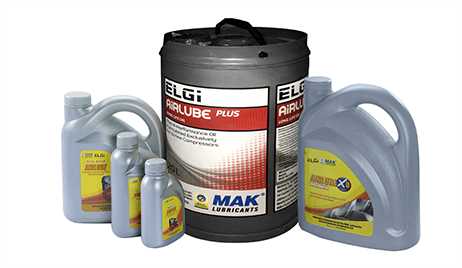
When it comes to the optimal functioning of an air compressor, choosing the right oil is crucial. Air compressor oil plays several important functions in ensuring the smooth operation and longevity of the equipment.
Lubrication: One of the primary functions of air compressor oil is to lubricate the moving parts of the compressor. The oil forms a protective film between the components, reducing friction and minimizing wear and tear. Lubrication is essential to prevent overheating and ensure smooth operation.
Cooling: Air compressors generate heat during operation, and the oil plays a vital role in cooling the system. The oil absorbs and dissipates the heat, preventing the compressor from overheating. Adequate oil cooling helps maintain the compressor’s efficiency and prevents damage caused by high temperatures.
Sealing: Air compressor oil also acts as a sealant, preventing air leakage and maintaining system pressure. The oil helps seal the gaps between the compressor components, preventing air from escaping. This improves the overall efficiency of the compressor and reduces energy consumption.
Cleaning: Over time, contaminants such as dust, debris, and moisture can accumulate in the air compressor. The oil acts as a cleaning agent, trapping and suspending these particles, preventing them from damaging the compressor. Regular oil changes help remove the accumulated contaminants, ensuring the proper functioning of the equipment.
Corrosion prevention: Air compressor oil contains additives that protect the internal components from corrosion. These additives form a protective layer on the surfaces, preventing rust and corrosion caused by moisture and air exposure. This helps prolong the lifespan of the compressor and ensures reliable and trouble-free operation.
Choosing the right oil: To maximize the performance of your air compressor, it is essential to choose the right oil based on the manufacturer’s recommendations. Factors such as viscosity, additives, and compatibility with the compressor’s materials should be considered. Regular maintenance, including oil changes, is crucial to ensure optimal lubrication and the efficient functioning of the air compressor.
Factors to Consider in Selecting the Right Oil for Your Air Compressor
Selecting the right oil for your air compressor is crucial for its optimal performance and longevity. There are several factors to consider when choosing the appropriate oil for your specific air compressor:
- Versatility: It is important to choose an oil that is suitable for a wide range of operating temperatures. This will ensure that the oil performs effectively in various weather conditions and does not break down easily.
- Viscosity: Viscosity refers to the thickness or consistency of the oil. It is essential to choose an oil with the correct viscosity for your compressor, as this will affect its ability to lubricate the internal components properly.
- Additives: Some oils come with additives that provide additional benefits such as improved lubrication, corrosion resistance, and reduced wear and tear. Consider the specific needs of your air compressor and choose an oil with the appropriate additives.
- Compatibility: Ensure that the oil you select is compatible with the materials used in your air compressor, such as seals and gaskets. Using an incompatible oil can lead to leaks and damage to the compressor’s components.
- Oil life: Check the recommended oil change intervals for your air compressor and choose an oil that has a long service life. This will minimize the frequency of oil changes and help maintain the compressor’s performance and efficiency.
Additionally, it is advisable to consult the manufacturer’s guidelines or seek professional advice when selecting the right oil for your air compressor. They can provide specific recommendations based on the compressor’s specifications and usage requirements. By considering these factors and using the appropriate oil, you can ensure that your air compressor operates at its best and lasts for a long time.
Viscosity Grade and Its Impact on Air Compressor Performance
The viscosity grade of the oil used in an air compressor plays a crucial role in determining the overall performance of the compressor. Viscosity refers to the thickness or resistance to flow of the oil. Different air compressors require different viscosity grades to ensure optimal functioning.
Low viscosity grade: Air compressors that operate at lower temperatures and have smaller clearances between moving parts generally require a low viscosity grade oil. This is because the oil needs to flow easily to provide proper lubrication and reduce friction. Using a higher viscosity grade oil in these compressors can lead to insufficient lubrication and increased wear and tear on the components.
High viscosity grade: On the other hand, air compressors that operate at higher temperatures and have larger clearances may require a higher viscosity grade oil. This is to ensure that the oil maintains its viscosity and provides sufficient lubrication even under high heat and pressure conditions. Using a lower viscosity grade oil in these compressors may result in oil thinning out and leading to inadequate lubrication.
Impact on performance: The viscosity grade directly affects the efficiency and longevity of an air compressor. Using the correct viscosity grade oil ensures that the compressor runs smoothly and the moving parts are properly lubricated, resulting in reduced friction, less wear and tear, and improved overall performance. Using an incorrect viscosity grade oil can cause excessive heat and wear on the components, which can lead to breakdowns and costly repairs.
Consult manufacturer recommendations: It is important to consult the manufacturer’s recommendations or the compressor’s user manual to determine the appropriate viscosity grade of oil to use. These recommendations take into account the specific design, operating conditions, and requirements of the air compressor, ensuring optimal performance and longevity.

Regular maintenance and monitoring: Regardless of the viscosity grade used, it is essential to regularly monitor the oil level and quality in the air compressor. Regular oil changes and proper maintenance will not only help maintain the compressor’s performance but also extend its service life.
Benefits of Using Synthetic Oil in Air Compressors
1. Improved Performance
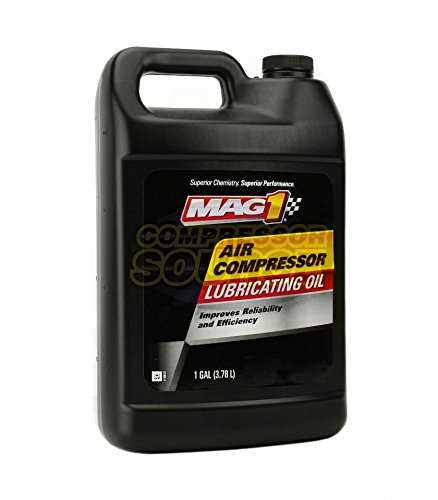
Using synthetic oil in your air compressor can significantly improve its performance. Synthetic oils are specifically designed to provide better lubrication and reduce friction between moving parts. This results in smoother operation and increased efficiency of the compressor. Additionally, synthetic oils have a higher viscosity index, meaning they maintain their viscosity over a wider range of temperatures. This ensures optimal performance of the compressor, even in extreme hot or cold conditions.
2. Extended Equipment Life
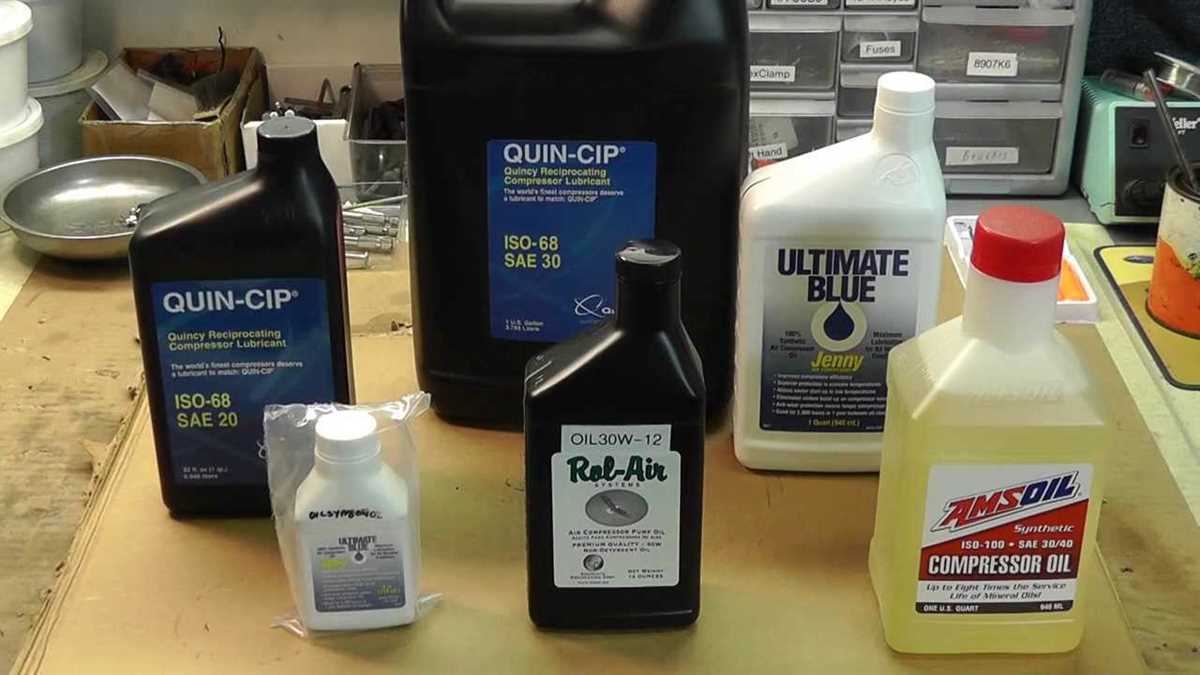
One of the main advantages of using synthetic oil in air compressors is that it can help extend the life of the equipment. Synthetic oils have superior wear protection properties, which means they can minimize the damage caused by friction, heat, and contaminants. By reducing wear and tear on the compressor’s components, synthetic oil can help prevent premature failure and costly repairs. This can ultimately save you time and money in the long run.
3. Enhanced Thermal Stability
Air compressors generate a significant amount of heat during operation. Synthetic oils are specially formulated to withstand high temperatures and maintain their properties under extreme heat conditions. This enhanced thermal stability ensures that the oil can continue to provide effective lubrication and protection even when exposed to prolonged periods of heat. By using synthetic oil, you can ensure that your air compressor remains reliable and performs optimally, even under heavy use and high temperature environments.
4. Improved Oil Life
Synthetic oils typically have a longer service life compared to conventional oils. This is because they are engineered with advanced additives and synthetic base oils that resist oxidation and degradation. As a result, synthetic oils can last longer without requiring frequent oil changes. This not only reduces maintenance costs but also minimizes downtime caused by oil changes. With longer oil life, you can keep your air compressor running smoothly for extended periods without interruption.
5. Environmental Friendliness
Synthetic oils are considered to be more environmentally friendly compared to conventional oils. They have a lower volatility and reduced evaporation rate, which means they are less likely to release harmful emissions into the atmosphere. Additionally, synthetic oils are typically biodegradable, allowing for safer disposal. By using synthetic oil in your air compressor, you can contribute to a greener and more sustainable environment.
Special Considerations for High-Temperature Environments
In high-temperature environments, such as industrial settings or hot climates, it is crucial to use the appropriate oil in an air compressor to ensure its proper functioning and longevity. The heat generated in these environments can have a significant impact on the performance and durability of the compressor, making it necessary to take special considerations.
When operating an air compressor in a high-temperature environment, it is important to choose an oil with a high viscosity index. A high viscosity index oil is less prone to thinning out and losing its lubricating properties at high temperatures. This helps to maintain a reliable lubricating film between the moving parts of the compressor, reducing friction and wear.
In addition to viscosity, it is also essential to consider the flash point of the oil used in high-temperature environments. The flash point is the temperature at which the oil can ignite when exposed to an open flame or spark. Using an oil with a high flash point can help minimize the risk of fire or explosion in hot environments.
Furthermore, it is advisable to use synthetic oils in high-temperature environments. Synthetic oils are specially formulated to withstand extreme temperatures and provide superior lubrication and protection. They have excellent thermal stability and can resist breakdown and oxidation, ensuring consistent performance even in challenging conditions.
Regular oil analysis and monitoring are essential when using an air compressor in a high-temperature environment. This allows for early detection of any oil degradation or contamination, allowing for preventive maintenance and avoiding potential issues that could lead to equipment failure.
Overall, selecting the right oil and paying attention to special considerations, such as viscosity, flash point, and the use of synthetic oils, is crucial for maintaining optimal performance and prolonging the lifespan of an air compressor in high-temperature environments.
Steps to Properly Change the Oil in Your Air Compressor
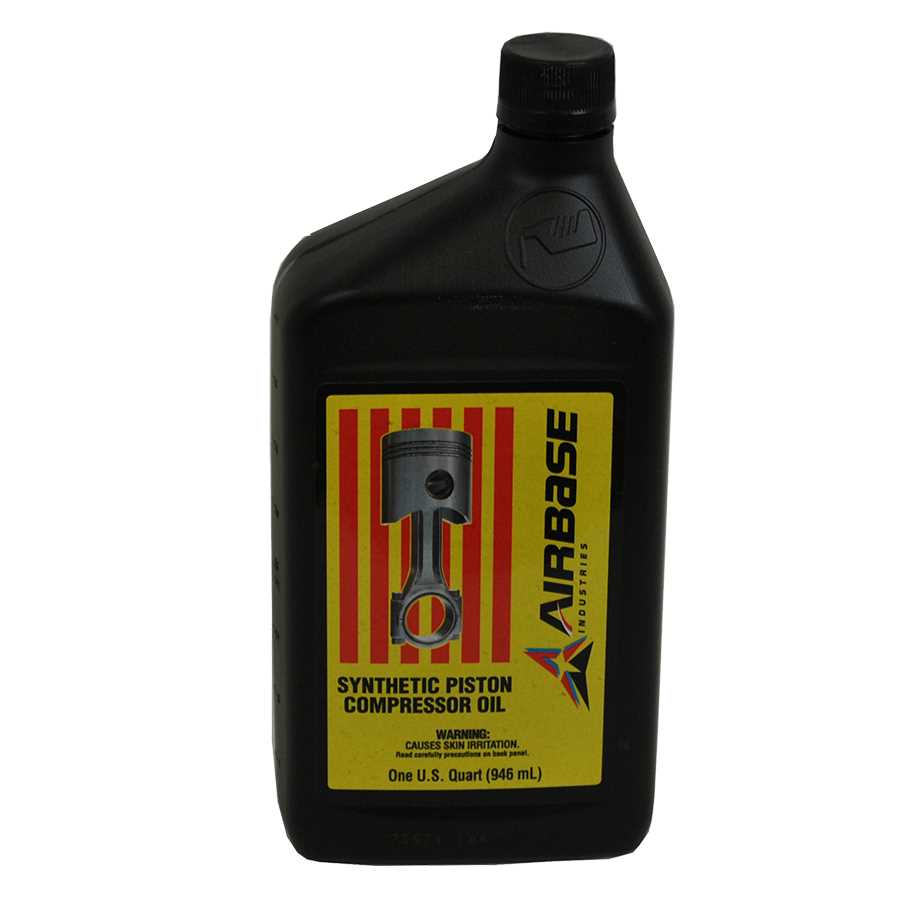
1. Consult the manufacturer’s manual
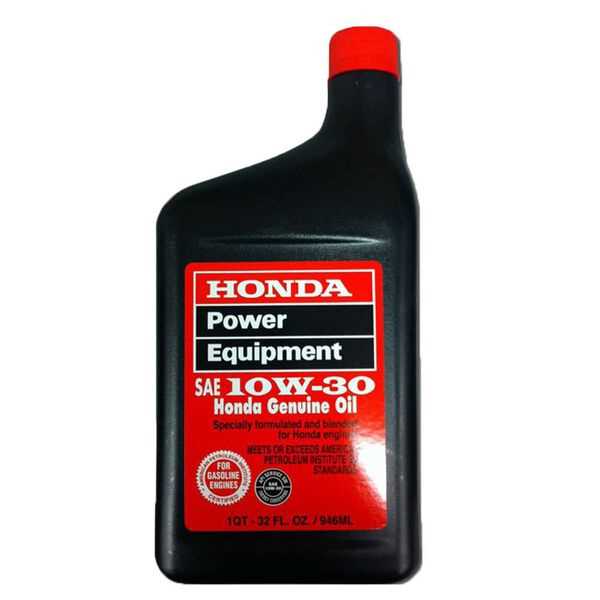
Before changing the oil in your air compressor, it’s important to consult the manufacturer’s manual for specific instructions and recommendations. Different air compressors may have different oil change intervals and requirements, so it’s important to follow the guidelines provided by the manufacturer.
2. Gather the necessary tools and supplies
Before starting the oil change process, gather all the necessary tools and supplies you will need. This may include a wrench or socket set, an oil drain pan, a funnel, and the appropriate type and amount of oil for your specific air compressor model.
3. Prepare the air compressor
Before draining the old oil, it’s important to prepare the air compressor. Start by turning off the compressor and unplugging it from the power source. Then, relieve any pressure in the compressor by opening the drain valve or using the release valve if your compressor has one.
4. Drain the old oil
Place the oil drain pan beneath the oil drain plug or valve of the air compressor. Use a wrench or socket set to loosen and remove the drain plug or open the valve, allowing the old oil to drain completely into the oil drain pan. Make sure to dispose of the old oil properly according to local regulations.
5. Replace the oil filter (if applicable)
If your air compressor has an oil filter, it’s recommended to replace it during the oil change process. Remove the old oil filter using a wrench or oil filter removal tool, and replace it with a new, compatible oil filter recommended by the manufacturer. Make sure to tighten the new filter securely.
6. Add new oil
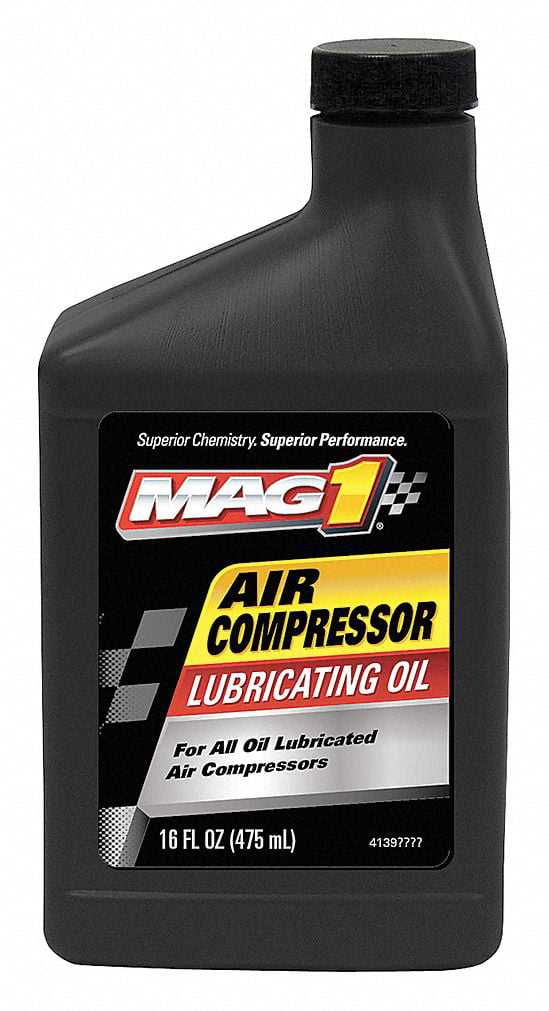
Using a funnel, pour the appropriate type and amount of new oil into the oil fill port of the air compressor. Refer to the manufacturer’s manual for the specific oil type and amount recommended for your compressor model. Make sure not to overfill or underfill the oil. Once the new oil is added, replace the oil fill cap securely.
7. Run and check
After completing the oil change, start the air compressor and let it run for a few minutes to allow the new oil to circulate throughout the system. Check for any leaks or abnormalities during this time. It’s also a good opportunity to check the oil level using the oil level sight glass or dipstick, and adjust if necessary.
8. Record the oil change
Keep a record of the oil change in your air compressor’s maintenance log or a separate record. Note the date of the oil change, the type and amount of oil used, and any other relevant information. This will help you keep track of the maintenance history and ensure regular oil changes in the future.
Common Mistakes to Avoid When Choosing Air Compressor Oil
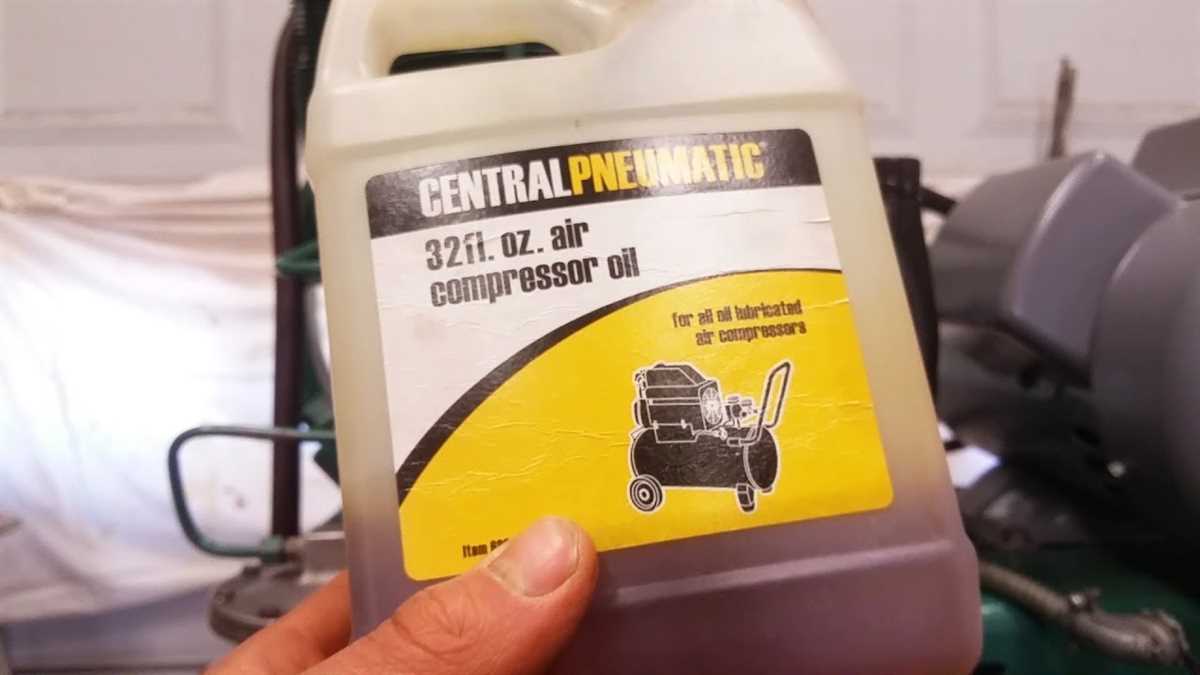
When it comes to choosing the right oil for your air compressor, there are several common mistakes that many people make. These mistakes can lead to poor performance, decreased lifespan of the compressor, and costly repairs. To ensure you make the right choice, here are some common mistakes to avoid:
1. Using the Wrong Viscosity
One common mistake is using the wrong viscosity of oil for your air compressor. The viscosity of the oil determines its thickness and ability to flow. Using oil with the wrong viscosity can result in inadequate lubrication, causing increased friction and wear on the compressor’s components. Make sure to check the manufacturer’s recommendations for the appropriate viscosity for your specific compressor model.
2. Ignoring Additives
Another mistake is ignoring the importance of additives in air compressor oil. Additives are chemicals that are added to the oil to enhance its performance and protect the compressor against rust, corrosion, and oxidation. Some common additives include anti-wear agents, detergents, and anti-foaming agents. Neglecting to use oil with the necessary additives can lead to decreased efficiency and increased wear on the compressor.
3. Using Automotive Oil
Using automotive oil instead of air compressor oil is another common mistake. While automotive oil may seem like a suitable alternative, it is not designed to withstand the unique conditions inside an air compressor. Air compressor oil is specifically formulated to handle the high temperatures, pressures, and moisture levels found in compressors. Automotive oil lacks the necessary additives and viscosity to provide adequate lubrication in these conditions.
4. Neglecting Regular Maintenance
One of the biggest mistakes is neglecting regular maintenance of your air compressor, including oil changes. Over time, the oil in your compressor can become contaminated with dirt, debris, and moisture, decreasing its effectiveness. It is important to follow the manufacturer’s recommended maintenance schedule and regularly change the oil to ensure optimal performance and longevity of your compressor.
By avoiding these common mistakes and choosing the right air compressor oil for your specific compressor, you can ensure that your compressor operates at its best and lasts for years to come.
FAQ:
What type of oil should I use in my air compressor?
You should use a high-quality, non-detergent oil specifically designed for air compressors. This oil helps lubricate the moving parts of the compressor and reduces friction and heat buildup.
Can I use regular motor oil in my air compressor?
No, you should not use regular motor oil in your air compressor. Regular motor oil contains detergents that can cause buildup and damage to the compressor. It is important to use a non-detergent oil that is specifically made for air compressors.
How often should I change the oil in my air compressor?
The frequency of oil changes for an air compressor can vary depending on factors such as usage and environment. As a general rule, it is recommended to change the oil every 500 to 1,000 hours of operation or every three to six months. However, it’s always best to consult the manufacturer’s instructions for your specific compressor model.
What happens if I don’t use the proper oil in my air compressor?
If you don’t use the proper oil in your air compressor, it can lead to increased friction and heat buildup, which can cause damage to the compressor’s moving parts. It can also lead to decreased performance and efficiency of the compressor. Using the wrong oil can void the warranty and potentially shorten the lifespan of the compressor.
Is synthetic oil a good option for an air compressor?
Yes, synthetic oil can be a good option for an air compressor. Synthetic oils offer better resistance to heat, oxidation, and breakdown, resulting in improved performance and longer oil life. However, it is important to check if your particular air compressor manufacturer approves the use of synthetic oil, as not all compressors are compatible.
Video:










